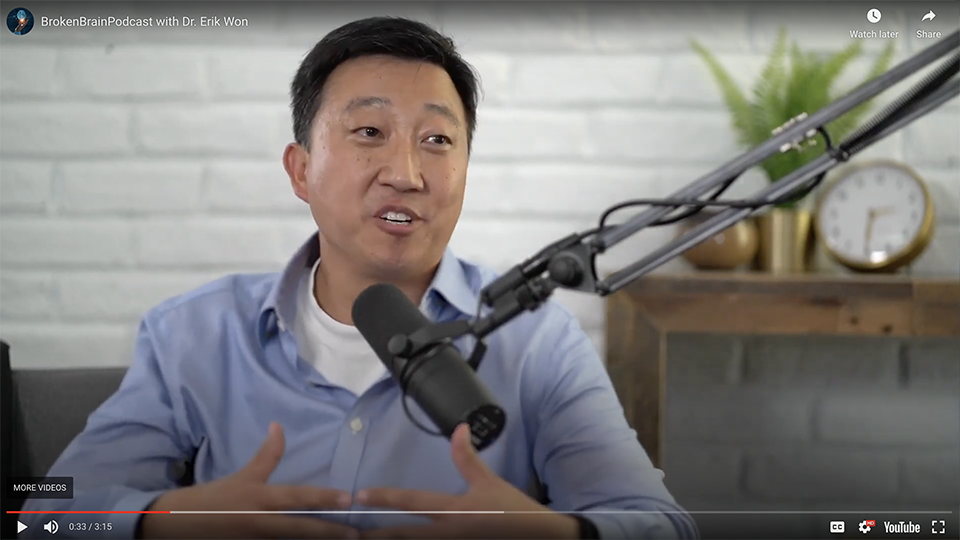
Post-Traumatic Stress Disorder (PTSD)
An Entirely New Approach to Treatment of Post-Traumatic Stress Disorder
A non-invasive, drug-free treatment for PTSD is now available here at BTC Plano. It’s called MeRT, which stands for Magnetic e-Resonance Therapy.
MeRT Can Help Free You from Your Post-Traumatic Stress Disorder Symptoms
If you have Post-Traumatic Stress Disorder (PTSD) or you live with someone who suffers from this condition, you know how hard it can be. You may feel you can’t escape the stress, depression, nightmares, and daily triggers.
Many treatments exist for PTSD symptoms, and they can be effective. But sometimes, despite many therapy and medications, the symptoms don’t go away — or they get worse.
We understand how debilitating this can be. That’s why we’re so proud to offer a breakthrough treatment for PTSD. It’s called MeRT®, which stands for Magnetic EEG-guided Resonance Therapy.
MeRT uses advanced diagnostics and technology to treat even the most severe symptoms. It specifically focuses on improving brain function and communication by targeting brainwaves that are out of sync.
MeRT is drug-free, non-invasive, and gentle. We have used it to successfully treat many patients with PTSD symptoms, giving them back a life they thought they’d lost forever.
It was absolutely terrifying to not know what was wrong with me or how to fix the problem. MeRT not only identified the deteriorated state of my brainwave activity, they restored its function… I consider the healing I experienced to be a miracle.”
– MeRT Patient after PTSD Treatment
Contact our
New Patient Coordinator
Or fill in the form at the bottom of the page for more information.
These factors can put you at higher risk for PTSD other than just the trauma itself:
- Lack of a support system through friends or family or support groups
- Not having a stable childhood
- Being exposed to multiple traumas throughout your life
- Being a first responder or exposed to combat
- A history of depression and/or anxiety
- Prior PTSD
Mert for PTSD
What is Post-Traumatic Stress Disorder?
PTSD is caused by experiencing or witnessing terrifying events, violence, or abuse. It can also happen because of extended periods of extreme stress. Some people who experience traumatic events or periods will have some time coping or grieving, but they will eventually get through it. For others, though, it can last for years and be quite debilitating.
PTSD doesn’t just affect veterans returning from war. It can happen to anyone who has experienced trauma. Common PTSD causes include:
- sexual, physical, or mental assault
- being involved in an accident
- having a near-death experience
- witnessing the death of another or others,
- combat exposure
- serious illness
- anything that causes you to perceive a threat to your life or another’s life
The onset of symptoms can occur right after a stressful time or can appear months or years later. Depression and anxiety often accompany PTSD, which can make the situation even worse.
Research shows that every year, an estimated 3.6% of adults are diagnosed with PTSD, suggesting that this is a growing problem.
The passage of time may sometimes ease symptoms, but even then, they can re-emerge if triggered. That’s why it’s so important to get the help you need.
What is MeRT?
MeRT is a tailored, highly individualized form of TMS or transcranial magnetic stimulation. In simpler terms, we use magnetic waves to stimulate specifically targeted areas of the brain that have been found to not be communicating or functioning optimally.
It is painless and completely non-invasive. You are fully conscious, and no drugs or anesthesia are involved. It’s simply magnetic waves that stimulate and balance the neurological functioning of your brain.
This is determined through sophisticated diagnostic tools and imaging and is used to plan a tailored treatment approach just for you.
The TMS equipment used is FDA-cleared to treat Major Depressive Disorder and OCD and is used off-label to treat a wide variety of conditions, including PTSD.
“That’s a miracle.”
Combat has robbed me of the ability to show my husband spontaneous affection. My husband’s PTSD is so severe that if I reach for him, he flinches. He swings at me and pushes and has actually smacked me. I have not been able to go up behind him and put my arms around him for seven years. But I was finally able to for the first time yesterday after only two days of treatment.
I actually walked up behind him, and he didn’t jump or flinch as I hugged him. He instead turned around and hugged me tight, kissed me, and said, ‘I love you, love.’ He’s usually never affectionate, loving, or happy towards me. That’s a miracle.”
– wife of Marine veteran
MeRT treatment for PTSD draws on extensive independent research published over many years.
This approach is a specialized form of rTMS (repetitive Transcranial Magnetic Stimulation) that has been refined through rigorous scientific investigation. Numerous studies featured in respected scientific journals support the foundation of MeRT. Here are some key examples.
A retrospective chart review to assess the impact of alpha-guided transcranial magnetic stimulation on symptoms of PTSD and depression in active-duty special operations service members, 21 June 2024.
“This data provides a demonstration of significant reduction in PTSD and depression symptoms and safety with the application of a-rTMS in active-duty special operations military personnel. Expansion of targeted neuromodulation programs could be impactful for military and civilian populations.”
How Electric Therapy Is Curing Navy SEALs of PTSD, Jan 2019.
“Hundreds of vets have tried out an experimental new treatment that could change how the world addresses mental disorders.” And, “All said that they saw big improvements after a course of therapy that ran five days a week for about four weeks.”
Synchronized transcranial magnetic stimulation for posttraumatic stress disorder and comorbid major depression:
“All participants demonstrated significant reductions in PTSD and MDD symptoms (all p < .001). As expected, there were significant reductions in symptoms in both treatment groups, but active stimulation did provide greater reductions in count of PTSD moderate-to-severe symptoms.”
Magnetic Resonance Therapy Improve Clinical Phenotype and EEG Alpha Power in Post-traumatic Stress Disorder, in Trauma Monthly, November 2015.
‘This study suggests that non-invasive neuromodulation magnetic resonance therapy may lead clinical improvements as well as a trend toward normalization of EEG pathophysiology in PTSD.”
Magnetic E-Resonant Therapy Alleviates Combat Related Post-traumatic Stress Disorder, in Aerospace Medical Association, March 2017.
“Our preliminary results suggest that transcranial MeRT may provide an alternate method to help veterans suffering from PTSD.”
Individualized Electromagnetic Treatment in Posttraumatic Stress Disorder: a Randomized, Double-blind, Sham-controlled Trial, Poster Accepted, Taghva, et al.
“This double-blind, randomized, controlled trial shows that transcranial magnetic therapy based on individualized frequencies derived from EEG/EKG is an effective therapy for PTSD in improving overall symptoms and quality of sleep.”
EEG_EKG Guided TMS in veterans with PTSD_Randomized double-blinded pilot study.
“Following 2 weeks of EEG-EKG guided transmagnetic stimulation, significant changes in symptom severity and EEG measures are reported for 80 retired military veterans with post-traumatic stress disorder. Patients had greatest comparative reductions in PCL-M subscales VII “avoid situation indicator” XII “short future indicator” and XIII “trouble falling or staying asleep indicator”. The improvement in sleep was confirmed for treated vs sham group in PSQI-A, and, may suggest correlation between sleep disorder and PTSD symptoms. Of the 37 patients who had suicidal ideation by HAM-D, 29 patients denied ideation by 4 weeks. No patient worsened in clinical PTSD symptoms after receiving therapy. “
Low-frequency, Repetitive Transcranial Magnetic Stimulation for the Treatment of Patients with Posttraumatic Stress Disorder: a Double-blind, Sham-controlled Study, Nam et al, 2013.
“The present study showed low-frequency rTMS to be an effective and tolerable option for the treatment of PTSD. Trials using variable indices of rTMS to the right prefrontal cortex and explorations of the differences in the effects on specific symptom clusters may be promising avenues of research regarding the use of rTMS for PTSD.
Our Medical Director, Neurologist Dr. Miller
Dr. Spencer O. Miller, a Neurologist in Dallas, Texas, is the owner and Medical Director of Brain Treatment Center Plano. He received his medical degree from the University of Mississippi School of Medicine and has been in practice for 12 years. He spent five of those years in the US Air Force, where he saw many brain injuries, including soldiers suffering from PTSD and traumatic brain injury (TBI).
Dr. Miller now specializes in MeRT treatment of traumatic brain injury, depression, post-traumatic stress disorder, dementia, autism, and multiple other brain disorders at his clinics, the Brain Treatment Centers in both Dallas and Plano.
Dr. Miller is also affiliated with Baylor University Medical Center, where he specializes in stroke, headache medicine, traumatic brain injury, post-traumatic stress disorder, and seizure. Additionally, he is associated with the Texas A&M Science Center College of Medicine.
He also speaks multiple languages, including Spanish.
More PTSD Treatment Testimonials
“THANK YOU SO VERY MUCH for your help with TMS/MeRT for my PTSD symptoms! Refiring those frontal lobe neurons had me reading ten novels in six months! I’ve NEVER read that many in ALL my prior life!
“The confusion, distraction, and memory issues were greatly reduced. The treatment does wonders. And whatever you did last time had an unexpected, incredibly wonderful effect. Besides helping with my sciatic, shoulder, and leg pains, I STOPPED TAKING OXYCODONE A WEEK AFTER, COLD TURKEY, unexpectedly AND WITH ZERO WITHDRAWAL SYMPTOMS!
“IT WAS LIKE I’D NEVER TAKEN THEM, but the truth is that I did for at least a decade prior. It was Vicodin for the decade prior to that. Now, while I do have some pains, I take NO OPIODS! I manage with ibuprofen, and Tylenol. This is worth every penny. THANK YOU!”
PTSD Patient
Patient“We have seen a dramatic change in Alex. He is so calm, happy, and positive. He wakes more alert. The man I knew was inside of him has finally come out. We are so much closer as a couple, and the relationship between our kids and him is much more functional.
“The VA has treated him for the past six years, and he’s undergone so much individual and group therapy, but it has NEVER had this positive effect on him. I will forever be grateful.”
Wife of Army Veteran
“Of all my injuries, by far the worst were the ones you could not see. I had degraded to the point of not being able to leave my home because of panic attacks and severe anxiety. I could not hide from this feeling, and no medication could numb it.
“At one point, I told my doctor I couldn’t kill myself because I have a family with young children that I am responsible for. I was living in despair and physical pain every day without reprieve — that is, until I was able to get treatment.
“I underwent neural restorative therapy [MeRT] for two months with total symptom resolution. Now I can function again at work and can spend much-needed time with my family. I have my sense of well-being back and a clarity of thought I haven’t had in many years.”
US Army Veteran
“With being diagnosed with PTSD, depression, and anxiety by Veterans Affairs, a calm and welcoming environment is important. The treatment makes me sleep longer and deeper than before treatment. My ‘dark feelings’ fade away. I feel happy and calm.”
Sean K.
“Within four days of being treated, I was sleeping through the night. My anger had subsided significantly, and I was smiling and enjoying things again. I was able to focus and concentrate on information much more efficiently and easily and did not get lost in conversation as I had prior to coming to BTC. My chronic headaches had ceased, my balance was returning, and my ringing in my ears (tinnitus) had also ceased.”
Marine EOD Tech
Patient“The experience I had at BTC was nothing short of a miracle. The treatment I received has completely changed my life for the better.
“I was able to reset my circadian rhythm and sleep through the night without medication. My nightmares became few and far between. My anxiety lessened almost immediately, and I became able to do the things I used to enjoy, like going to the gym, cooking, and reading.
“I could focus my attention again, and my mood lightened a lot. My fiancé and family immediately noticed the change in me and said that it was like they had gotten their ‘old’ Sarah back.”
US Army Veteran
PatientPTSD Treatment with MeRT
Testimonials tell a story…
And ours tell one of a brighter future! Listen to the stories of those who have been through the MeRT Protocol.
MeRT Treatment Featured on The Broken Brain Podcast
The Broken Brain Podcast explores the inner workings of the brain and body. One episode featured MeRT as a breakthrough treatment for a variety of neurological issues, particularly PTSD.
Dr. Eric Won from Wave Neuroscience (the parent company of MeRT) speaks about using MeRT treatment with military members who have experienced depression, TBI, and PTSD from serving their country. Dr. Won also gives testimony to the incredible successes of these veterans after treatment.

Contact Our New Patient Coordinator for More Information
Our New Patient Coordinator is here for you. During your consultation, she will take the time to answer any questions that you may have, listen to your concerns, and carefully explain all the details and information you need.
If, after talking to her, you are interested in further exploring whether you could benefit from MeRT, the next step would be to schedule an EEG and a consultation with our doctor.
With thorough diagnostics, the doctor can show you what is happening in your brain and what may be causing the issues. At this point, we can determine whether you (or your loved one) may benefit from MeRT Treatment, and you can decide if you would like to move forward.
Call our New Patient Coordinator
Or fill in the form below.
Life Can Be Better
You or your loved one can be at peace and enjoy life. With so many successful treatments for a wide range of neurological conditions, we encourage you to explore the possibilities of MeRT Treatment. It can have a lasting impact — and an improved quality of life!

